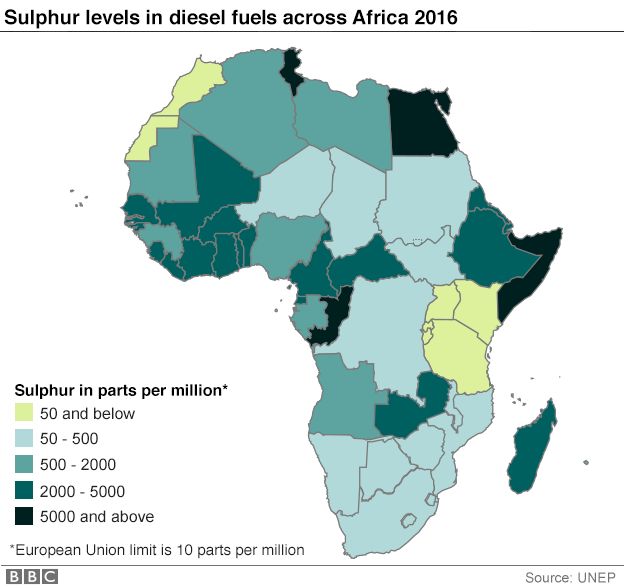Five countries in West Africa have decided to stop importing "dirty fuels" from Europe, the UN Environment Programme says.
A recent report revealed that European companies were exploiting weak regulations in West Africa to export fuels with high levels of sulphur.
Nigeria, Benin, Togo, Ghana, and Cote d'Ivoire agreed on the import ban.
The UN says the move will help more than 250 million people breathe safer and cleaner air.
The sulphur particles emitted by a diesel engine are considered to be a major contributor to air pollution and are ranked by the World Health Organization (WHO) as one of the top global health risks.
It is associated with heart disease, lung cancer and respiratory problems.
In a statement, the UN environment programme says the West African group, in addition to banning the import of dirty fuels, has also agreed to upgrade the operations of their national refineries.
The upgrade, which will concern both public and privately owned refineries, is meant to boost standards in the oil produced in the five countries.
The report into Europe oil exports released in September particularly criticised the Swiss for their links to the African trade in diesel that has toxin levels illegal in Europe.
The study was by the campaign group, Public Eye, which said retailers were exploiting weak regulatory standards.
Erik Solheim, the head of UN Environment Programme, hailed the import ban.
"West Africa is sending a strong message that it is no longer accepting dirty fuels from Europe," Mr Solheim said.
"Their decision to set strict new standards for cleaner, safer fuels and advanced vehicle emission standards shows they are placing the health of their people first," he added

For a long time African countries relied on colonial-era standards, which have only been revised in recent years.
Nigeria's Environment Minister Amina Mohamed said: "For 20 years, Nigeria has not been able to address the vehicle pollution crisis due to the poor fuels we have been importing.
"Today we are taking a huge leap forward - limiting sulphur in fuels from 3,000 parts per million to 50 parts per million."

Nigeria's environment minister said the move would result in major air quality benefits
She said the move would result in major air quality benefits in Nigerian cities and would allow the country to set modern vehicle standards.
The WHO says that pollution is particularly bad in low and middle-income countries.
Latest Stories
-
Mahama hits the ground running: Key reforms and directives in first days of office
2 minutes -
Relatives wait for news as body bags hauled from South African mine
10 minutes -
Kate reveals she is in remission from cancer
29 minutes -
UK’s Treasury minister resigns over anti-corruption investigation in Bangladesh
43 minutes -
Fire Service calls for installation of fire extinguishers, detectors at marketplaces
44 minutes -
Kofi Adu Domfeh: Prayers for rain in LA and the call for climate action
47 minutes -
Don’t appoint Bawku or Kusasi native as U/E Regional Minister – Asamoah Boateng advises Mahama on averting dispute
1 hour -
Bono COCOBOD seizes trucks loaded with bags of cocoa, lumber
1 hour -
Recent Appointment Committees have become a theatre – Draman
2 hours -
Mahama appoints Justina Nelson as Acting CEO of MIIF
2 hours -
Tribunal system was evil, why does Mahama gov’t want it back? – Ansa-Asare
2 hours -
Kurt Okraku files nomination for CAF Executive Committee position
3 hours -
Criminologist urges police to engage communities to prevent attacks on security personnel
3 hours -
E Vibes: ‘The Greatest Band’ features on debut of Musical Band Series
4 hours -
KNUST signs MoU with Estonian Academy of Arts for mutual growth in education and research
4 hours

